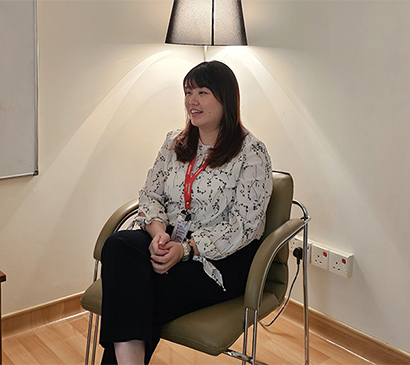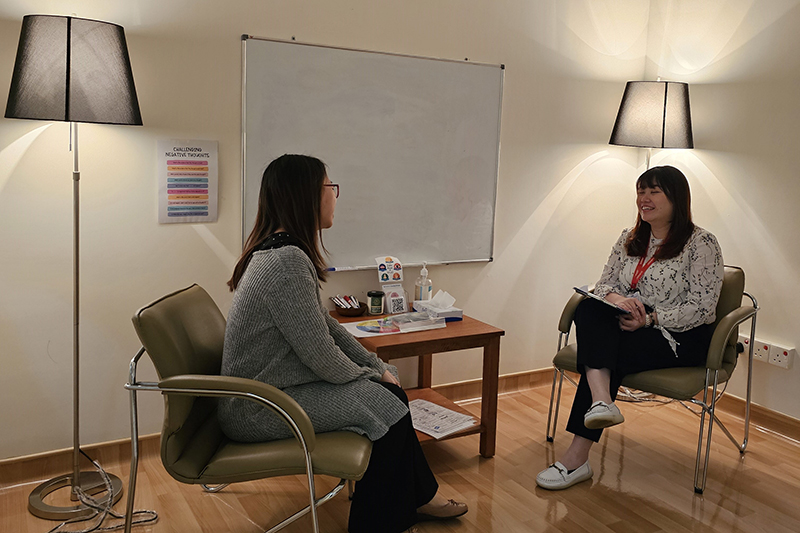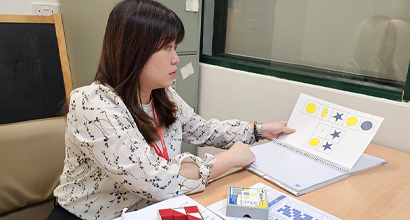Shining a Light on Mental Health: Interview with Clinical Psychologist, Michelle Chong
19 July 2024
.jpg)
Did you know that 1 in every 8 people worldwide lives with a mental disorder, as reported by the World Health Organization (WHO)? Despite its prevalence, mental health is frequently overlooked.
We sat down with Michelle Chong, a dedicated clinical psychologist at Sunway Medical Centre, Sunway City, who is actively bridging this gap. Since joining the hospital in May 2023, Michelle has played a pivotal role as one of the clinical psychologists here. Her responsibilities include providing care to outpatient and inpatient cases, as well as offering mental health support to the staff at Sunway Group. Additionally, she is often invited to give mental health talks and workshops.
Michelle's practice focuses on addressing emotional and social-behavioural issues, primarily related to mental health concerns. Through her work, she actively works to reduce stigma surrounding mental health, offering compassionate care and sharing valuable insights gained from her experience as a psychologist.
What Motivated Her to Become a Clinical Psychologist
Describing herself as a busybody with a passion for listening to stories, Michelle found genuine fulfilment in understanding human behaviour. “There’s always a reason behind people’s actions, and for me, delving into these reasons is fulfilling,” she said.
From a young age, she was profoundly affected by the mental health challenges within her family circle. Whether observing younger relatives grappling with device addiction or witnessing older family members struggling with anxiety and depression, these experiences ignited her desire to make a difference in their lives.
Her Approach in Therapy
One of her strengths as a clinical psychologist is her knack for methodically ruling out various possibilities. She sees herself as an investigator, meticulously gathering information from parents, teachers, friends, and medical professionals to build a detailed profile of each patient. Following this, she uses assessment tools like IQ tests and TOVA to uncover underlying causes. These tests are essential for identifying different types of mental health disorders such as anxiety, depression, bipolar disorder, and others.
What She Finds Most Fulfilling About Her Job
The thing that makes her proud as a therapist is seeing the patients’ progress. “One patient in particular struggled with clinical depression. When he first walked into my office, he was slouching and wore a cap to hide his face. Throughout our sessions, he remained reserved, only responding when I asked him questions,” she recalled.
However, in a recent session, she observed noticeable changes. Despite his continued slouching, he now walks a little straighter and no longer wears the cap. Most importantly, he has started opening up and sharing more about himself. Witnessing these small but significant transformations fills her with immense joy and motivates her to persist in her efforts.

The Case That Scarred Her
Once, a patient with borderline personality disorder became upset upon learning that administrative staff, instead of Michelle herself, handled the paperwork. “She misunderstood the confidentiality clause and thought that I’ll be the person who not only treats her, but also handles her appointments and other admin stuff,” Michelle explained.
This misunderstanding led the patient to lash out at the admin staff when she discovered someone else handled her appointment scheduling. She even threatened to visit Michelle’s workplace unless her documents were destroyed. Security measures were taken as a precaution, although she did not follow through with her threat. “Eventually, she demanded that we conduct a video call and shred her documents in front of her.”
The Most Valuable Lesson She Learned
One valuable lesson Michelle has learned is the necessity of maintaining clear boundaries between her professional and personal lives. When she finishes her workday, she makes a deliberate effort to disconnect from work-related matters. Ensuring all tasks are completed before leaving, even if it requires staying late, allows her to transition mentally and focus on her personal life at home and prevent burnout.
The One Thing She Still Struggles With
Despite her role as a therapist, she grapples with compassion fatigue. After expending significant emotional energy on her patients at work, she often feels emotionally drained at home. This has impacted her relationships, leading to moments of impatience and nitpicking with her fiancé. Recognising this challenge, she is actively addressing it with her therapist to find strategies for managing her emotional well-being more effectively.
Going for Therapy as a Therapist
Initially excited about starting therapy, Michelle began to have doubts as the session approached. "I worried about what to say, whether I could trust the therapist, if the therapist would judge me and how the sessions would unfold. But I told myself to just give it a try and push myself to it," she recalled. Over time, she found solace in the therapy room, where she could freely express herself and gain valuable insights into her personal challenges.

Her Advice to Those Who Are Afraid to Seek Help
“Dying is easy, but choosing to live takes courage," she reflected. Recognising bravery in getting help is crucial for healing. “Seeking help is often perceived as weak, but it takes courage to reach out when you need it and don’t wait till it’s too late to seek help.” She advised starting small by confiding in trusted people like family or friends. If they need more support, consider seeking professional help.
The Best Advice She's Received
One of the best pieces of advice she’s received is from Dr. Phang at Sunway Medical Centre, Sunway City. He emphasised that as psychologists, “we don't need to save them, we just need to be there to support and that’s enough” This perspective guides Michelle in focusing on building therapeutic relationships and providing empowering support to her patients.
Her Advice to Those Aspiring to be Clinical Psychologists
“Don’t do it for the money,” Michelle quipped. “Pursue this career out of passion and a genuine desire to help people, rather than financial gain.”
Thank you, Michelle Chong, for her invaluable contributions to the hospital and her passionate advocacy for mental health awareness.
Back





